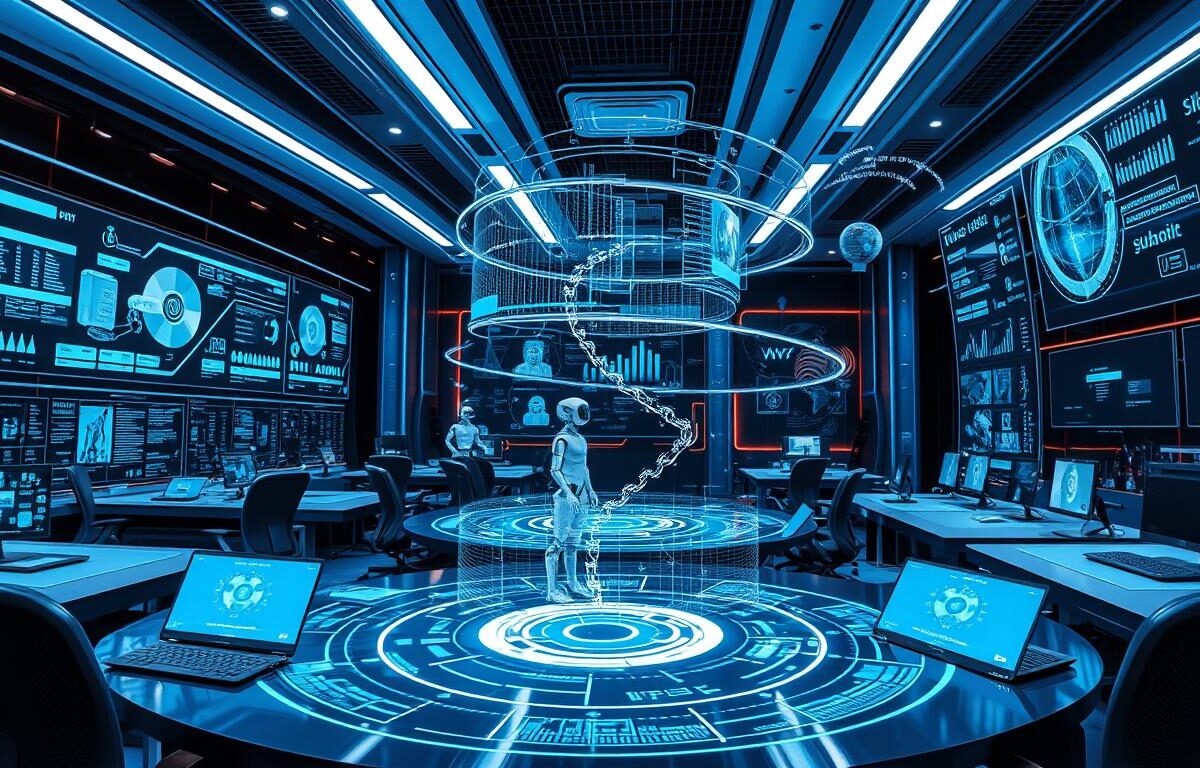In today’s world, businesses move fast. Artificial intelligence (AI) is now more crucial than ever. AI agents are a game changer in this area. They can think, make choices, and act with little need for people. They help companies do tasks faster and stay ahead in a constantly changing market.
By 2030, AI could make up 45% of the workforce. This shift shows how vital AI agents are for companies. They adapt quickly to changes, offering a flexible way to manage. McKinsey’s study says AI could raise company profits by a lot. It might bring an extra $2.6 trillion to $4.4 trillion every year.
With better AI and machine learning, companies are ready to change. Now, anyone can build AI agents thanks to easy tools. This could lead to more creativity and growth. Businesses can get stronger and reach new heights.
Key Takeaways
- AI workforce: Predicted to be 45% of the overall workforce by 2030.
- Financial impact: Generative AI technologies could boost corporate profits by up to $4.4 trillion annually.
- Adaptability: AI agents enhance dynamic and adaptable management approaches.
- Democratization: Low-code/no-code AI agents enable broader creation and use.
- Efficiency: AI agents automate tasks, reduce human error, and increase operational efficiency.
Understanding AI Agent Operations
Artificial Intelligence (AI) agents use sophisticated algorithms and machine learning. They’re smart systems that do tasks with little help from humans. This boosts efficiency in businesses by using AI. They automate tasks, make work flow smoothly, and bring new ideas.
What are AI Agents?
AI agents come in different types, based on what they can do. They work with Large Language Models, Machine Learning, and Natural Language Processing. They’re used in various ways:
- Reactive agents handle simple tasks efficiently, such as password resets or balance inquiries.
- Model-based agents use past data to personalize support, enhancing customer satisfaction.
- Goal-based agents make decisions to achieve specific objectives, like lead qualification in sales.
- Utility-based agents prioritize actions to maximize success in handling complex tasks like collections.
- Conversational agents manage thousands of interactions simultaneously, ensuring consistent support.
By automating repetitive work, these agents can save up to 40% of the work week. This lets employees focus on strategy.
Role of AI Agents in Modern Businesses
Today, AI agents are key in improving how businesses operate and make decisions. They serve many purposes:
“By 2028, 33% of enterprise software applications will include AI-driven components, a significant increase from less than 1% in 2024, facilitating autonomous decision-making in 15% of day-to-day work decisions.”
AI agents help businesses decide better by looking through huge data amounts and offering insights. They assist in enterprise search by creating summaries of meetings and insights on sales data. They also boost customer support, leading to 50% fewer errors and quicker responses.
| Type of AI Agent | Function | Benefit |
|---|---|---|
| Reactive Agents | Handle simple tasks efficiently | Reduce operational costs and improve response times |
| Model-based Agents | Personalize support using past data | Enhance customer satisfaction |
| Goal-based Agents | Make decisions to achieve specific goals | Increase lead qualification efficiency |
| Utility-based Agents | Maximize success in complex tasks | Optimize task handling and success rates |
| Conversational Agents | Manage thousands of interactions | Ensure consistent and scalable support |
Using AI agents in work helps a lot. They make decision-making and scaling easier. This reduces costs and makes operations smoother. AI ensures productivity stays high, fits the budget, and answers employee questions well.
Key Use Cases of AI Agents in Business Operations
AI agents have transformed business operations, making things run smoother and boosting productivity. We’ll look into four key areas where AI agents really make a difference.
Coordinating Industrial Processes
AI agents are key in coordinating industrial processes. They make sure machines and workflows operate together without a hitch. These AI systems, especially in manufacturing, use machine learning to improve efficiency. For example, AI helps in planning software updates carefully. This minimizes work stoppages. Tools like Kandji help manage these updates efficiently.
Managing Workforce and Business Activities
AI agents are crucial in automating everyday tasks and boosting strategic planning. Take Atomicwork’s IncidentAssist. It groups similar IT issues together. This reduces the strain on IT teams. They provide quick solutions to common issues by accessing an internal knowledge base.

Predicting and Evaluating Customer Outcomes
AI agents are great at forecasting customer actions and aiding in decision-making. They spot trends by examining customer behavior. This leads to smarter strategic planning. For instance, agents can point to helpful knowledge base articles. Atom’s AgentAssist displays this by suggesting articles and past incidents to speed up solutions.
Communicating with Clients
AI agents also shine in customer communications. They automate replies and offer immediate help. AI chatbots are a prime example, working round-the-clock to handle basic queries. This eases the workload on human agents. This way, they can focus on more complicated issues. The outcome is a big leap in customer satisfaction.
Below you can see a table that highlights important stats and functions of AI agents:
| Functionality | Impact |
|---|---|
| Autonomous handling of password resets (e.g., Atom AI) | Reduced operational costs by up to $85K/year |
| Automated access provisioning requests | Ensured compliance with security policies |
| Streamlined incident response (e.g., Atomicwork’s IncidentAssist) | Efficient incident handling and stakeholder notification |
| Automated customer service responses (e.g., AI chatbots) | 24/7 support and cost reduction in human resources |
Streamline Operations with AI Agent
Using AI agents boosts efficiency in many fields. They make things smoother for businesses, like how they streamline business operations with AI agent. In healthcare, for example, they’re a big help. AI agents schedule visits and sift through studies. This speeds up finding new meds.
In finance, AI agents are key for spotting fraud. They check tons of transactions quickly. Plus, they make customer service better with automated stuff. They understand what people say (thanks to NLP). So, they can answer questions any time. This lets the human team do the big-picture work.
Manufacturing has also gotten a boost from AI. Using AI, factories can tell when machines might break. They also check if products are made right. This lessens mistakes and keeps things running smoothly.
Retail stores use AI to get what customers want. They guess future trends and handle stock better. This makes shopping feel more personal. They can also talk to shoppers on social media, give updates on orders, and suggest items. Happy customers like this, which means they buy more.
AI agents fit right in with what companies already have. This makes starting to use new tech easier. Automate tasks with AI technology in many areas. Whether fixing computers, taking care of buildings, helping customers, or managing networks. By setting them up in a smart way, AI agents help everything work together better. This amps up how well everything operates.
| Industry | AI Agent Benefits |
|---|---|
| Healthcare | Patient care enhancement, appointment scheduling, research analysis |
| Finance | Real-time fraud detection, automated banking processes, customer support |
| Manufacturing | Predictive maintenance, quality control, supply chain optimization |
| Retail | Personalized shopping, inventory management, social media interaction |
AI in Supply Chain Management
Using AI can make supply chains work better and respond faster. By using AI, companies can make their logistics, stocks, and whole supply chains better. This helps them keep up with changes in the market.
Dynamic Decision-Making Mechanisms
AI is key to making quick decisions in supply chains. They can quickly look through a lot of data. This lets them give fast advice to enhance purchasing, making, and delivering goods. This makes the work process better. People who used AI early in supply chain management saw big benefits. They had 15% lower costs in logistics, their inventory went up by 35%, and their service levels rose by 65%.
Designing Integrated Business Strategies
AI also helps create better business strategies. It does this by joining operations from different areas together. By using real-time data, AI makes sure strategies work well together. This helps the business run smoother.
The process includes monitoring and planning by agents. These agents help in making better strategies.

Automating Tasks and Freeing Human Resources
AI is great at doing repetitive jobs, which lets people focus on more important work. Automating with AI cuts mistakes, speeds up responses, and makes productivity go up. For instance, AI helps keep just the right amount of stock on hand. It predicts what will be needed and keeps an eye on supplies. This way, it decides when to get more stock to avoid running out.
| Aspect | Before AI Implementation | After AI Implementation |
|---|---|---|
| Logistics Costs | High | 15% Lower |
| Inventory Levels | Inconsistent | 35% Higher |
| Service Levels | Moderate | 65% Higher |
In conclusion, using AI in supply chains doesn’t just make work flow better. It also helps businesses stay ahead with more efficient operations and new strategies.
The Intersection of Multi-Agent AI and Business Efficiency
Multi-agent AI systems mix various AI agents working together. This team effort boosts business processes greatly. For example, companies like Google and Salesforce have adopted AI to stay ahead.
By 2025, multi-agent AI is set to change many industries. It uses AI to make operations smoother and meet key goals. These systems are great at making smart decisions because they use real data and clear rules.
Also, people who aren’t tech experts can use low-code platforms. This makes it easier to create AI tools that learn and improve.
The mix of generative AI and AI in business is very exciting. AI agents can, for example, change supply levels in real-time. This cuts down on waste and makes services better.
AI agents save time, too. This lets companies focus on big picture plans. In the finance and trading world, these systems help make quick, smart decisions. This could mean more money through better market analysis.
The key parts of AI agents include smart language models and the ability to work well with data. OpenAI’s Swarm helps make quick decisions in areas like banking and cryptocurrency.
But, bringing in AI tools means thorough testing is needed. Trying them out internally first can show their value. Having an AI Agent Manager can help make sure AI is used in a good way.
To show how broad multi-agent systems can be:
- Healthcare: They help hospitals use resources better, helping patients more.
- Smart Cities: They work on improving traffic and energy use.
- Disaster Response: They help organize rescue efforts and evaluate damage.
Multi-agent systems might soon change areas like global tax, environmental care, learning, manufacturing with robots, and cybersecurity.
In the end, the fast growth of multi-agent AI shows how much they can help businesses. They boost efficiency and bring new ideas to many fields, as shown by the expansive growth of multi-agent AI frameworks.
Conclusion
AI is changing the game in business. It makes things like managing stock and understanding what customers want easier. By doing this, companies work better, spend less, and make customers happier. Learn how AI can upgrade performance with machine learning
It’s also making businesses safer. AI can spot problems early and keep operations running smoothly. It even predicts when machines will break. This means businesses can fix them before any trouble starts.
AI does more by doing the routine jobs, suggesting custom ideas, and helping people work together better. This helps everyone do their best work. Plus, AI is there all day, every day, making sure things run fast and smooth, especially for tech support.
Looking ahead, things like edge computing and smarter AI will create even more chances for businesses to grow. AI is getting better every day, despite hurdles like keeping data safe. It’s set to make a big impact on how businesses run in the future.
FAQ
What are AI Agents?
AI agents are autonomous computer programs. They can perceive their environment, make decisions, and act to achieve goals. They’re built on algorithms and machine learning, working with minimal human help.
How do AI agents streamline operations?
AI agents automate tasks and coordinate processes. They provide deep data insights. This boosts efficiency and lets humans focus on strategy.
What operational areas can benefit from AI agent integration?
Manufacturing, workforce management, customer service, and monitoring can greatly benefit. AI agent integration boosts these areas significantly.
How do AI agents improve customer engagement?
They predict customer behaviors and evaluate outcomes. AI agents also enhance communication channels. This leads to better and more personalized customer service.
What is the role of AI agents in supply chain management?
AI agents provide dynamic decision-making in supply chains. They adapt to changes and automate tasks. This keeps operations efficient, no matter what.
How can businesses enhance productivity with AI agents?
Businesses use AI agents to automate tasks, both simple and complex. This frees up human resources for strategic work. It boosts innovation and productivity.
What are dynamic decision-making mechanisms in AI agents?
These are AI agents’ capabilities to adapt to changes in real-time. For example, they handle supply chain disruptions to maintain efficiency and effectiveness.
How do AI agents assist in strategic planning?
AI agents analyze data from business segments in real-time. They help create comprehensive business strategies. This ensures operations are well-coordinated across all departments.
What is the significance of multi-agent AI systems?
Multi-agent systems involve several AI agents working together. They improve connectivity and flexibility. This leads to better decision-making and agility in business.
How does AI technology revolutionize business operations?
AI technology changes business operations by making workflows efficient. It drives innovation, automates processes, and offers deep insights. The result? Better efficiency, lower costs, and happier customers.



